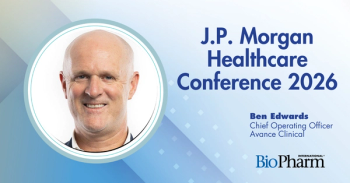
- BioPharm International-10-01-2009
- Volume 22
- Issue 10
Building a Turnkey Manufacturing Solution
Lonza's bid for Patheon makes the contract manufacturing industry re-examine the one-stop manufacturer model.
The contract manufacturing world was roiled in August when Lonza (Basel, Switzerland), a market leader in manufacturing large-and small-molecule active pharmaceutical ingredients (APIs), announced an offer to acquire Patheon (Research Triangle Park, NC), the second largest contract manufacturer of drug products. Lonza offered to buy shares of Patheon for $3.55 per share, valuing the company at about $700 million (market capitalization plus debt).
Jim Miller
Most industry participants were stunned by the audacity of the move: Lonza was wading into an intense battle for control of Patheon already being waged by the private equity firm JLL Partners (New York, NY) and a committee of independent directors representing non-JLL shareholders. JLL had been Patheon's white knight two years ago when it needed to restructure its finances, providing $150,000 in exchange for preferred shares of the company. Earlier this year, JLL offered $2 for the outstanding shares of Patheon, and now owns 57% of the company (including the conversion of its preferred shares to regular shares). That tender offer triggered a series of public relations and courtroom skirmishes with Patheon's independent directors over the value of the company. The independent directors, believing the company is worth more than $2 per share, have welcomed Lonza's offer.
Beyond that initial reaction, however, the industry is questioning Lonza's stated rationale for wanting to acquire Patheon. Lonza has been quite clear for some time about its interest in adding formulation development and dose manufacturing to its service mix. The aim is to make Lonza into a turnkey supply chain solution for bio/pharma companies, able to deliver both the API and finished drug product in the major pharmaceutical markets. As recently as July, Lonza's CEO Stefan Borgas stated that the company had $1 billion available to spend on acquisitions, and that dose manufacturing was a principal target area for acquisitions.
To the degree that strategy makes sense, acquiring Patheon would enable Lonza to implement it on a large scale. The contract manufacturing organization (CMO) already has the following advantages:
- Patheon is the second-largest dose manufacturer, with $570 million in revenues from manufacturing commercial products.
- It has manufacturing operations in five countries on two continents (three facilities in the US, three in Canada, and four in Europe including two in Italy, one in France, and one in the UK) spanning most major dose forms.
- It has one of the largest drug development operations, with revenues of $130 million.
- It has successfully completed a painful restructuring process that has driven a lot of cost out of its operations and positioned it for significant revenue and profit growth.
QUESTIONING THE RATIONALE
However, Patheon's attractiveness as an acquisition candidate aside, there are still a lot of questions about the viability of the one-stop manufacturer strategy. Among the major objections that might be raised about the strategy are the following:
- There are no critical scientific or technical links between API and dose manufacturing that might be enhanced by putting the two operations together. To the extent that issues like solubility, stability, or particle size require interaction among API and dose manufacturers, that interaction can be handled as readily between two entities as within two operating units of the same CMO.
- Custom API manufacturing is a high value-added activity, where process development and proprietary technology can confer significant competitive advantage and command price premiums. Dose manufacturing in most cases involves more conventional off-the-shelf technology and is more commoditized.
- Dose manufacturing has proven to be an activity with low barriers to entry. In particular, the effort by major bio/pharma companies to sell off redundant facilities has allowed too many competitors into the industry and kept too much capacity on the market. Pricing is often the major competitive variable, even for supposedly higher-value activities like lyophilization and syringe filling.
KEY ADVANTAGES
We think that Lonza brings some attributes to a combination with Patheon that might obviate these negatives. One of its biggest assets is the scope of its capabilities. With offerings in both small-and large-molecule API process development and manufacturing, including microbial fermentation, mammalian cell culture, peptides, high potency APIs, and antibody conjugates, it is positioned to service most of the candidates in even the largest new product portfolio. Combined with its financial soundness and a reputation for operational reliability, it is well positioned to be selected as a preferred provider by global bio/pharma companies seeking to consolidate their sourcing activities into a small number of vendors. By acquiring Patheon, Lonza has the opportunity to enhance its preferred provider status by adding dose manufacturing while extending its preferred provider "halo" to Patheon's dose manufacturing offerings.
A second major asset that Lonza brings to the Patheon acquisition is its ability to put together long-term strategic deals with major bio/pharmaceutical companies. Lonza has announced long-term strategic relationships for its biomanufacturing services with Genentech and Novartis, and claims to be negotiating more such deals. Those announced transactions are notable for their innovation and comprehensiveness, combining its manufacturing expertise with elements of financial engineering and risk management. It is likely that Lonza executives expect that they can use their preferred partner status and deal-making skills to negotiate major comprehensive supply agreements that Patheon cannot do on its own, incorporating API and dose manufacturing capabilities, and filling Patheon's dose manufacturing capacity.
PRECEDENT SET
Of course, these advantages are meaningless if Lonza cannot convince JLL Partners to sell its shares. JLL has publicly rejected Lonza's offer and stated its intention to maintain its stake in Patheon and help Patheon's management grow the company. Lonza for its part has said it would not raise its price. We can assume that these are both negotiating positions and that the companies will explore ways of meeting their objectives.
By the time this column gets published the situation may have been settled, but even if Lonza is unsuccessful in acquiring Patheon, a precedent has been set. Lonza has announced its determination to add dose formulation and manufacturing to its API development and manufacturing capabilities. The move will no doubt prompt other API manufacturers to seriously consider the merits of the one-stop manufacturing model for their own positions. In fact, several API manufacturers, including DSM, PCAS, and Boehringer Ingelheim already have significant dose manufacturing capabilities.
We could be on the verge of a major consolidation of the contract manufacturing industry.
Jim Miller is president of PharmSource Information Services, Inc. , Springfield, VA, 703.383.4903,
Articles in this issue
over 16 years ago
BioPharm International, October 2009 Issue (PDF)over 16 years ago
Biotech Remains Upbeat During the Summerover 16 years ago
Biopharmaceuticals: Approval Trends in 2008over 16 years ago
Harvesting the Benefits of LEAN in Biopharmaceutical Manufacturingover 16 years ago
A Closer Look at Automated In-Line Dilutionover 16 years ago
Pharma and Healthcare Reform, Part 2over 16 years ago
Apply the "Butterfly Effect" to Streamline Your Supply Chainover 16 years ago
FDA Leaders Stress Science and ComplianceNewsletter
Stay at the forefront of biopharmaceutical innovation—subscribe to BioPharm International for expert insights on drug development, manufacturing, compliance, and more.




